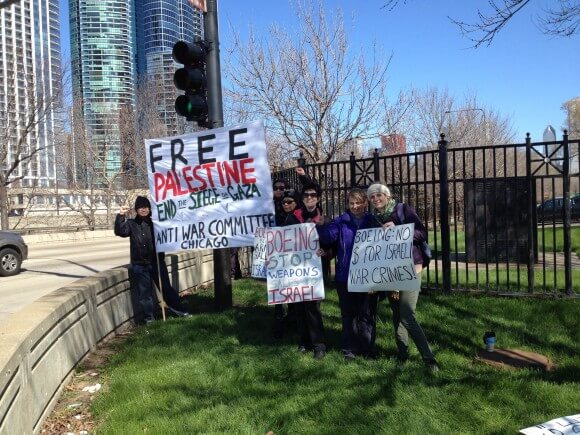While companies like Caterpillar and Hewlett-Packard have taken the center stage of the BDS movement, activism against Boeing has also been making its way to the front over the past year. Boeing has been targeted by anti-war activists for decades because of its production of drones and fighter jets. In the case of Palestine, Boeing recently signed a contract with Israel for an $83 million resupply of JDAMs. These “smart bomb kits” convert unguided bombs into guided weapons.
In Chicago, the Anti-War Committee has spearheaded the campaign at the country’s headquarters. They allege that, because 81% of the bombs dropped by Israel in the Gaza Strip used smart bomb technology during Operation Cast Lead, that “Boeing contributed directly to the deaths of over 80% of the Palestinian dead.” For the past three years, the Anti-War Committee has protested outside of Boeing’s annual shareholder meetings. In August of 2014, during Operation Protective Edge, the group helped organize a sit-in at Boeing’s headquarters where three Anti-War Committee members were arrested on grounds of trespassing. During Operation Protective Edge, the group also participated in the Palestine marches in Chicago. These marches were the largest demonstrations around the issue of Palestine that the US had ever seen. While many of the marchers targeted the Israeli Consulate, the Anti-War Committee also encouraged protesters to continue the marches to Boeing’s headquarters as well in order to hold them accountable for their weapons sales to Israel.
The Anti-War Committee Chicago doesn’t only pressure Boeing from outside their shareholder meetings, but from within as well. Kait McIntyre, Joe Iosbaker and Newland Smith are three leaders of the Anti-War Committee Chicago who have all bought shares in Boeing . In 2014, the group nominated Kait McIntyre to Boeing’s Board of Directors on an anti-war platform before she was disqualified due to a technicality.
This strategy of buying stock is called shareholder activism and is a form of activism using an inside-out approach. By buying single shares in a publicly held company, activists can become privy to shareholder meetings that are held annually in the United States by law. Electing a new board of directors, discussing annual reports and announcing future objectives are common topics of discussion at these meetings. Shareholders are usually given some time to voice their concerns and present resolutions as well.
On April 27th, 15 activists gathered outside Boeing’s annual shareholders meeting at the Field Museum in downtown Chicago. Prior to the meeting, the activists held a press conference where they spoke about Boeing’s weapon sales to Israel. Joe Iosbaker said, “I’m here in particular to talk to Boeing about their provision of weapons to Israel despite the mounting charges of genocide against the Israeli military. The Boeing company continues to sign contracts and renew contracts … We find that to be completely unacceptable morally and ethically, It’s contributing to an unjust war.” Also speaking were Kait McIntyre, Arnold Stieber from Veterans for Peace, Nerissa Allegretti of National Alliance for Filipino Concerns, Dale Lehman from Neighbors for Peace of Evanston, Illinois, and Sisters Barbara Jennings and Gwen Ferry of the Midwest Coalition for Responsible Investment. A video from the press conference can be seen here:
Following the press conference, McIntyre, Iosbaker and Smith attempted to enter the meeting with their shareholder tickets. While McIntyre and Smith were allowed to enter, Iosbaker was turned away because of an alleged computer error. Inside the meeting, attendees were allowed to address the audience for 1 minute each. McIntyre spoke first and made it clear to Boeing that through their involvement with Israel they had made themselves targets of the BDS movement. Smith then spoke about the psychological scars that Israel’s bombs have left on the Palestinian people. Both McIntyre and Smith felt that the board appeared obviously shaken after this comment. Upon leaving the meeting, one shareholder approached Smith and told him that he shared their concerns and encouraged the Anti-War Committee to present a resolution.
The Anti-War Committee plans to draft a resolution regarding Boeing’s involvement with Israel which they will submit prior to the 2016 annual shareholder meeting. The resolution will require a minimum number of shares in order to be put up for vote. The group hopes to attain this through the combined support of the Midwest Coalition for Responsible Investment and other compassionate shareholders.
While purchasing shares in Boeing may seem counter-intuitive to some, Joe Iosbaker maintains that he still considers himself and the Anti-War Committee’s work to be part of the BDS movement. Often, when speaking about the BDS movement, Joe says, “a lot of people ask us, ‘well have you tried to talk to the companies?’.” In the case of the Anti-War Committee, they are able to say that they have and are still doing so. McIntyre, former candidate for Boeing’s Board of Directors, says “Combined with the rallies outside, delivering the message directly to the board of directors and the other shareholders becomes a powerful statement.”
Shareholder activism was seen to have an effect on the struggle against apartheid in South Africa. An academic paper titled “The Impact of Shareholder Activism on Corporate Involvement in South Africa During the Reagan Era“,” by Philip A. Boyles argues that shareholder activism was “effective in changing corporate policy on South Africa”. During the 1960’s, divestment campaigns spread about campuses in the US and onwards to several church denominations in the early 70’s. While many groups were divesting, others were submitting shareholder resolutions. According to the Investor Responsibility Research Center, over two dozen shareholder resolutions were in existence by the end of the 70’s. In his paper, Boyles says, “The primary objective of the anti-apartheid movement was complete disengagement of the United States from South Africa. … For [the shareholder activists], the primary objective was getting corporations to adopt fair labor practices and to stop supporting the South African military and police.” Because many of their shareholder resolutions were passed, Boyles believes that the shareholder activists were successful in their struggle against apartheid.
More recently, shareholder activism made the news in the case of the oil and gas company Shell. The company was met with a shareholder revolt in 2010. At that time, environmentalists had rallied support amongst the shareholders to reconsider the exploitation of oil fields in Canada’s tar sands.
If the shareholder activists of the BDS movement can succeed in receiving media coverage and passing shareholder resolutions they will consider their struggle a success. Despite the sacrifices of investing in an unethical companies, the activists believe that a resolution for the betterment of the lives of the Palestinians would be worth it.
UPDATE: Since the writing of this article, the US has approved a contract with Israel for $1.879 billion dollars of weapons. This will include more than 14,000 JDAM kits manufactured by Boeing.



Excellent article Katy! And thank you for embedding my video. I wish it had better sound, but I think it works ok w/ the subtitles…
Though I was aware that Joe and Kait were shareholders, I wasn’t aware of the “shareholder activism” concept/tactic more broadly. Thanks you for specifically fleshing out this concept. I assume I’m not the only one who was not very familiar w/ this strategy having a longer history. Very cool. Sure, I can see why folks may have issues w/ it. But if it gets the job done…
You mention AntiWarCommittee’s participation in one of the “largest demonstration…” marches last year against Protective Edge. Yes, it was huge and inspirational. I followed it from start to finish and uploaded a video of it as well. The vid is intentionally kinda long, and shows the march moving through many different downtown locations, so as to give the viewer a better idea of the scope of the march. Thanks again Katy, and maybe I’ll see you ’round Chicago:
https://www.youtube.com/watch?v=pNSpMHziO00
In the women’s rights movements, I always admired the tactic of women getting close to the wives of governors, presidents, etc…to make change.
While this is adifferent way of getting close, it might be just as effective.
This is a terrific strategy.
Many thanks for everything that you do!